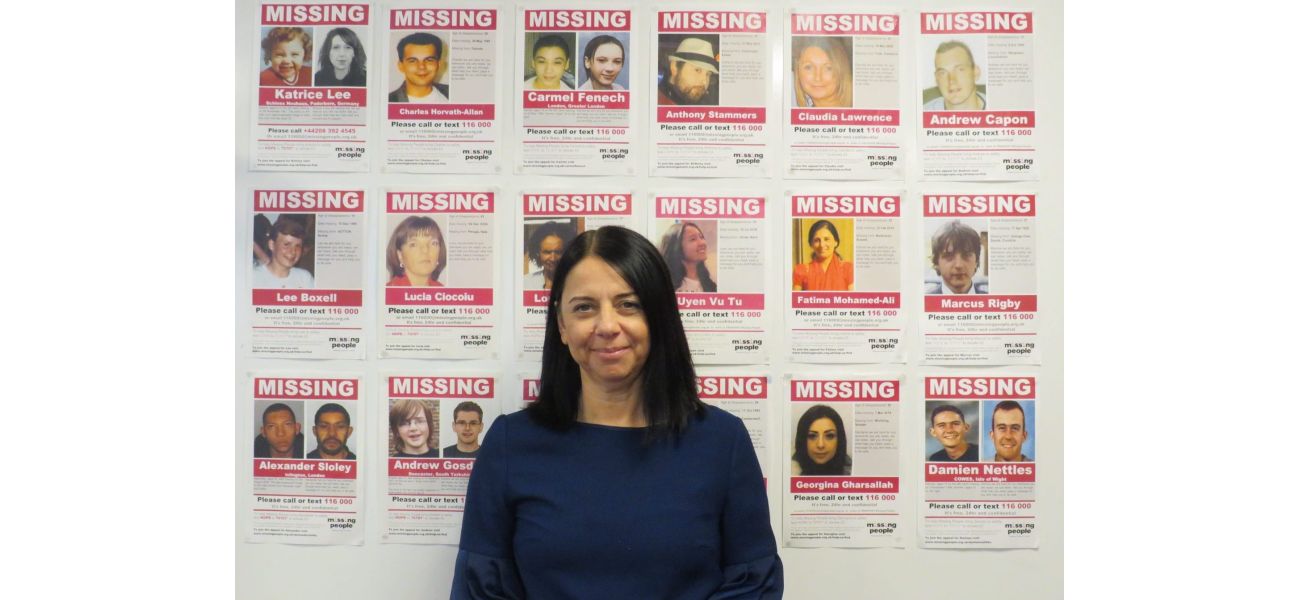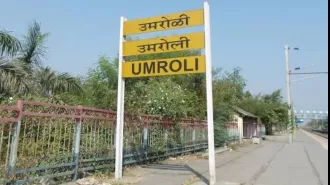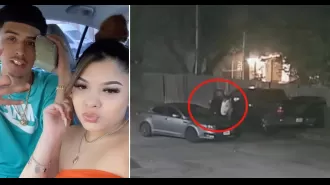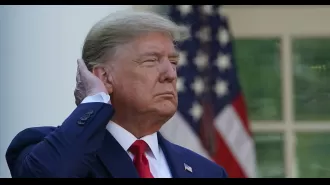What occurs when a person disappears in the UK?
The unknown will always attract people.
January 11th 2025.

Jo Youle is a dedicated CEO who takes her job very seriously. As she sits in her office, she can't help but notice the smiling faces of strangers staring back at her from the photos on her wall. These are the faces of missing individuals that have been reported to her organization, Missing People. Founded in 1986 by two sisters, Mary Asprey and Janet Newman, after the disappearance of Suzy Lamplugh, the charity has since helped families of high-profile missing persons like Claudia Lawrence, Andrew Gosden, and Lee Boxell. Their posters are scattered throughout Jo's office, serving as a constant reminder of the struggles that families of missing people go through.
In the UK alone, 170,000 people are reported missing each year, which translates to one person every 90 seconds. Martha McBrier, the helplines manager at Missing People, has been answering calls from missing individuals and their families for the past six years. With a soothing Scottish accent, she patiently listens to each caller's story and offers her support in any way she can.
Martha's work is essential in mobilizing support for missing persons, as the organization reaches out to various individuals and organizations in the region where the person was last seen. Through their TextSafe program, in partnership with Samaritans, they also send messages to those who have expressed mental health concerns. More often than not, these efforts result in the person being found and returning home safely.
But not all cases have happy endings. Sometimes, the missing person is not found, and their families are left to deal with the uncertainty and pain. In these situations, the general public can help by sharing the charity's posters and social media posts, contributing to the search efforts. However, it's essential to remember to be respectful and not speculate about the missing individual's private life, as it can be hurtful and distracting for their loved ones.
Jo is aware that the decision to go missing is not always within the person's control, especially when it comes to mental health issues. With their latest campaign, the organization is trying to reach out to those who may be considering disappearing and offer them support and guidance. Jo believes that most people who go missing eventually return home, and there is a misconception about how many people are reunited with their families.
Kirsty Hillman, who works on the charity's Lost Contact desk, has been instrumental in reuniting many families who have lost touch. Through her work, she has seen how various issues, such as addiction, homelessness, or a difficult divorce, can lead to people losing contact with their loved ones. But with just a few pieces of information, Kirsty and her team can work their magic and reconnect family members who thought they would never see each other again.
The reunions that Kirsty helps facilitate are often emotional and heartwarming. Whether it's a son and mother who haven't spoken in years, two brothers who have been separated for decades, or a father and son who have lost touch due to dementia, the joy and gratitude from these families are immeasurable.
The personal connection between the Missing People team and the families they help is evident. Belen Pavani-Sattin, a call-handler, has a wall of thank-you cards from the families she has supported. Her job goes beyond just answering calls; she provides a listening ear, helps families through difficult times, and prepares them for funerals and inquests.
For Jo, Martha, Kirsty, Belen, and the rest of the Missing People team, their work is more than just a job. It's a mission to support and give a voice to the families of missing individuals, and they will continue to do so with compassion and dedication.
Jo Youle has a special connection to the photographs lining the walls of her office. These are not just any pictures, they are the faces of missing individuals. Some are old, some are young, but all of them are strangers to Jo. As the CEO of Missing People, she is determined to give a voice to the families of those who have disappeared. The organization was founded in 1986 by two sisters, Mary Asprey and Janet Newman, after their own sister, Suzy Lamplugh, went missing. Since then, Missing People has provided support to families of high-profile missing persons, such as Claudia Lawrence, Andrew Gosden, and Lee Boxell. Their posters are displayed throughout Jo's office, serving as a constant reminder of the struggles that these families face.
According to Jo, approximately 170,000 people are reported missing each year in the UK, which equates to one person every 90 seconds. Martha McBrier, the helplines manager at Missing People, has been answering calls from missing individuals and their families for six years now. With a soothing Scottish accent, she offers support and assistance to those in need. Martha's day is filled with a variety of calls, ranging from individuals reaching out for help to run away, to distressed parents seeking guidance when their loved ones have gone missing. She explains that there are many different reasons why someone may go missing, and it is their job to handle each case with care and sensitivity.
When someone disappears, Missing People immediately mobilizes a search effort in the region where they were last seen. By simply clicking a few buttons, postmen, park wardens, and day center managers are alerted and provided with a brief description of the missing person. The organization also has a partnership with Samaritans, called TextSafe, which sends a message to the phone of anyone who has expressed mental health concerns. More often than not, the missing person is found after appeals are made. Sometimes, they even reach out to Missing People to explain what happened and express their gratitude for being heard and supported.
However, during these search efforts, the general public can also play a vital role by sharing Missing People's posters and social media posts. Unfortunately, there are instances where the public's involvement can lead to speculation and conspiracy theories, as seen in the case of British teenager Jay Slater and missing mother Nicola Bulley. Jo emphasizes the importance of using social media to spread the word and help find missing individuals, but also urges the public to refrain from speculating or making it personal, as it can be hurtful to the families who are going through a traumatic time.
It is a common misconception that only children and young adults go missing. In reality, most adults who disappear do so due to mental health problems. Some choose to do so, usually to escape a difficult situation at home. Missing People's recent campaign focuses on reaching out to those who are thinking of disappearing and offering support before they make that decision. Jo explains that ideally, no one should feel that going missing is their only option. But when it does happen, it is important to have a safety net and support system in place. Most missing individuals do end up returning home, and Jo believes that there is a misunderstanding about how many people are reunited with their families.
Kirsty Hillman, who is nicknamed "the real Davina McCall" for her work on the charity's Lost Contact desk, has been reuniting relatives who have lost contact for years. She explains that there are many different reasons why people lose touch, and it often happens during times of change or difficulty. Whether it's addiction, homelessness, or a difficult divorce, Kirsty can help with just a name, date of birth, and last known address. Once the individual is found, Missing People will send a letter with their contact information. The responses vary, but some of the most heartwarming moments are when estranged family members are reunited after many years. Kirsty recalls a recent case where two brothers hadn't spoken since 1987 and were brought back together over Christmas. She also mentions a mother and son who were separated by a divorce and were able to reconnect during lockdown.
The team at Missing People forms personal connections with the families they help. Belen Pavani-Sattin, a call-handler at the organization, has a wall behind her desk adorned with thank-you cards from the families she has supported. Whether it's listening to their stories, offering guidance during an inquest, or preparing them for a funeral, Belen is there to provide comfort and support during a difficult time. The work done by Missing People is not just about finding missing individuals, but also about bringing families back together and helping them through the challenges they face. Jo, Martha, Kirsty, Belen, and the whole team at Missing People are dedicated to giving a voice to the families of lost individuals and providing support when they need it most.
In the UK alone, 170,000 people are reported missing each year, which translates to one person every 90 seconds. Martha McBrier, the helplines manager at Missing People, has been answering calls from missing individuals and their families for the past six years. With a soothing Scottish accent, she patiently listens to each caller's story and offers her support in any way she can.
Martha's work is essential in mobilizing support for missing persons, as the organization reaches out to various individuals and organizations in the region where the person was last seen. Through their TextSafe program, in partnership with Samaritans, they also send messages to those who have expressed mental health concerns. More often than not, these efforts result in the person being found and returning home safely.
But not all cases have happy endings. Sometimes, the missing person is not found, and their families are left to deal with the uncertainty and pain. In these situations, the general public can help by sharing the charity's posters and social media posts, contributing to the search efforts. However, it's essential to remember to be respectful and not speculate about the missing individual's private life, as it can be hurtful and distracting for their loved ones.
Jo is aware that the decision to go missing is not always within the person's control, especially when it comes to mental health issues. With their latest campaign, the organization is trying to reach out to those who may be considering disappearing and offer them support and guidance. Jo believes that most people who go missing eventually return home, and there is a misconception about how many people are reunited with their families.
Kirsty Hillman, who works on the charity's Lost Contact desk, has been instrumental in reuniting many families who have lost touch. Through her work, she has seen how various issues, such as addiction, homelessness, or a difficult divorce, can lead to people losing contact with their loved ones. But with just a few pieces of information, Kirsty and her team can work their magic and reconnect family members who thought they would never see each other again.
The reunions that Kirsty helps facilitate are often emotional and heartwarming. Whether it's a son and mother who haven't spoken in years, two brothers who have been separated for decades, or a father and son who have lost touch due to dementia, the joy and gratitude from these families are immeasurable.
The personal connection between the Missing People team and the families they help is evident. Belen Pavani-Sattin, a call-handler, has a wall of thank-you cards from the families she has supported. Her job goes beyond just answering calls; she provides a listening ear, helps families through difficult times, and prepares them for funerals and inquests.
For Jo, Martha, Kirsty, Belen, and the rest of the Missing People team, their work is more than just a job. It's a mission to support and give a voice to the families of missing individuals, and they will continue to do so with compassion and dedication.
Jo Youle has a special connection to the photographs lining the walls of her office. These are not just any pictures, they are the faces of missing individuals. Some are old, some are young, but all of them are strangers to Jo. As the CEO of Missing People, she is determined to give a voice to the families of those who have disappeared. The organization was founded in 1986 by two sisters, Mary Asprey and Janet Newman, after their own sister, Suzy Lamplugh, went missing. Since then, Missing People has provided support to families of high-profile missing persons, such as Claudia Lawrence, Andrew Gosden, and Lee Boxell. Their posters are displayed throughout Jo's office, serving as a constant reminder of the struggles that these families face.
According to Jo, approximately 170,000 people are reported missing each year in the UK, which equates to one person every 90 seconds. Martha McBrier, the helplines manager at Missing People, has been answering calls from missing individuals and their families for six years now. With a soothing Scottish accent, she offers support and assistance to those in need. Martha's day is filled with a variety of calls, ranging from individuals reaching out for help to run away, to distressed parents seeking guidance when their loved ones have gone missing. She explains that there are many different reasons why someone may go missing, and it is their job to handle each case with care and sensitivity.
When someone disappears, Missing People immediately mobilizes a search effort in the region where they were last seen. By simply clicking a few buttons, postmen, park wardens, and day center managers are alerted and provided with a brief description of the missing person. The organization also has a partnership with Samaritans, called TextSafe, which sends a message to the phone of anyone who has expressed mental health concerns. More often than not, the missing person is found after appeals are made. Sometimes, they even reach out to Missing People to explain what happened and express their gratitude for being heard and supported.
However, during these search efforts, the general public can also play a vital role by sharing Missing People's posters and social media posts. Unfortunately, there are instances where the public's involvement can lead to speculation and conspiracy theories, as seen in the case of British teenager Jay Slater and missing mother Nicola Bulley. Jo emphasizes the importance of using social media to spread the word and help find missing individuals, but also urges the public to refrain from speculating or making it personal, as it can be hurtful to the families who are going through a traumatic time.
It is a common misconception that only children and young adults go missing. In reality, most adults who disappear do so due to mental health problems. Some choose to do so, usually to escape a difficult situation at home. Missing People's recent campaign focuses on reaching out to those who are thinking of disappearing and offering support before they make that decision. Jo explains that ideally, no one should feel that going missing is their only option. But when it does happen, it is important to have a safety net and support system in place. Most missing individuals do end up returning home, and Jo believes that there is a misunderstanding about how many people are reunited with their families.
Kirsty Hillman, who is nicknamed "the real Davina McCall" for her work on the charity's Lost Contact desk, has been reuniting relatives who have lost contact for years. She explains that there are many different reasons why people lose touch, and it often happens during times of change or difficulty. Whether it's addiction, homelessness, or a difficult divorce, Kirsty can help with just a name, date of birth, and last known address. Once the individual is found, Missing People will send a letter with their contact information. The responses vary, but some of the most heartwarming moments are when estranged family members are reunited after many years. Kirsty recalls a recent case where two brothers hadn't spoken since 1987 and were brought back together over Christmas. She also mentions a mother and son who were separated by a divorce and were able to reconnect during lockdown.
The team at Missing People forms personal connections with the families they help. Belen Pavani-Sattin, a call-handler at the organization, has a wall behind her desk adorned with thank-you cards from the families she has supported. Whether it's listening to their stories, offering guidance during an inquest, or preparing them for a funeral, Belen is there to provide comfort and support during a difficult time. The work done by Missing People is not just about finding missing individuals, but also about bringing families back together and helping them through the challenges they face. Jo, Martha, Kirsty, Belen, and the whole team at Missing People are dedicated to giving a voice to the families of lost individuals and providing support when they need it most.
[This article has been trending online recently and has been generated with AI. Your feed is customized.]
[Generative AI is experimental.]
0
0
Submit Comment





